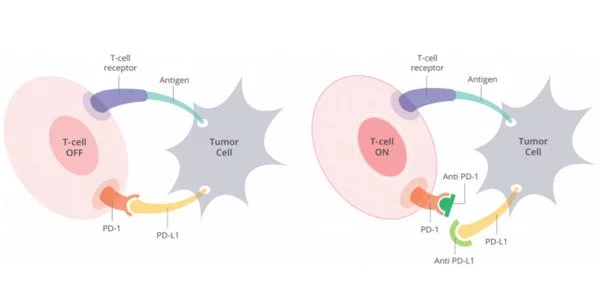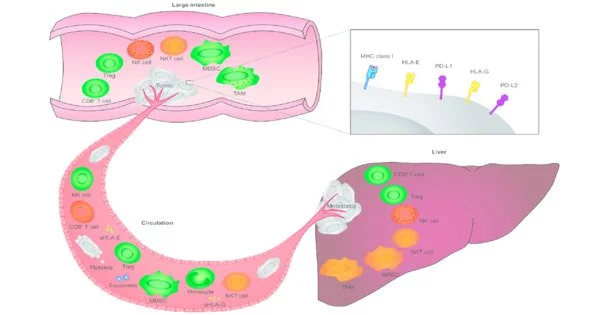Cancer cell proteins can play a complex function in modulating the immune response to malignancies. Understanding how the immune system recognizes and responds to cancer cells is one of the most important areas of cancer immunology. Through a process called as immunological surveillance, the immune system may recognize and remove malignant cells. Cancer cells, on the other hand, can devise a variety of ways to avoid immune recognition and killing.
Scientists at the German Cancer Research Center (DKFZ) have discovered a new and surprising function of a membrane protein on the surface of cancer cells: it supports and stabilizes an important “co-stimulatory” factor that increases T cell activation, thereby improving the immune response to the tumor. The study was conducted in collaboration with researchers from the Netherlands Cancer Institute.
Immune checkpoint inhibitors (ICI) can successfully treat a wide range of cancers. This therapy is frequently referred to as “immunotherapy.” The treatment is based on the inhibition of inhibitory immunological checkpoint proteins such as PD-L1. However, a concurrent lack of stimulatory signaling can render the therapy ineffective. This is thought to be one of the reasons why immune checkpoint inhibitors do not benefit many cancer patients.
T cells are crucial in the immunological response against malignancies. A range of inhibitory and stimulatory immunological checkpoints regulate their activation. Tumor cells, on the other hand, frequently sabotage this system by altering the expression of checkpoint proteins in order to avoid destruction by the immune system.
Our findings highlight the importance of CMTM6 and CD58 expression in cancer cells during an immune response against tumors. Our next step is to explore the possibility of adjusting their expression in laboratory experiments. Our goal is thereby finding a way to improve cancer immunotherapies.
Chong Sun
CD58 is one of the co-stimulatory proteins that promote activity. When it connects to its receptor on an immune cell, it sends a stimulatory signal to the cell. When the binding of CD58 to its receptor is inhibited, the immune response to various malignancies is compromised.
“It is intriguing to note that many cancer cells express CD58, a molecule that essentially contradicts their own survival when they are attacked by the immune system. We wanted to know what controls CD58 expression,” explains Chong Sun, an immunologist at the German Cancer Research Center.
With their current study, the researchers found that the membrane protein CMTM6 interacts and positively regulates the expression of CD58. The surprising thing is that CMTM6 simultaneously interacts with PD-L1, the important inhibitory immune checkpoint molecule that most current ICI therapies target. CMTM6 protects PD-L1 from degradation and likewise also stabilizes CD58 via this mechanism. This mechanism potentially fine-tunes immune response.

Moreover, using a model of TCR-T cell treatment in the culture dish, the researchers showed that CMTM6 loss from tumor cells impairs T cell activation. They also found that the influence of CMTM6 on CD58 plays an important role in the antigen-specific interaction of T cells with tumor cells and also affects the response to PD-L1 blockade.
“It’s fascinating that CMTM6 controls two important players in our immune system, CD58, and PD-L1, despite their opposing functions. What’s more interesting is that when we dive into the analysis of tumor samples from patients who received ICI therapies, it appears that CD58 might just take a leading role in shaping the response, in most cases,” adds Beiping Miao, one of the study’s primary authors.
Using transplanted human leukemia cells in mice, the researchers revealed that CMTM6 deletion protects cancer cells from CAR-T cell treatment. Furthermore, extensive-expression of CMTM6 and CD58 was found in human cancer cells from tumor tissues, with higher expression of CMTM6 or CD58 substantially linked with improved response to immunotherapies.
“Our findings highlight the importance of CMTM6 and CD58 expression in cancer cells during an immune response against tumors. Our next step is to explore the possibility of adjusting their expression in laboratory experiments. Our goal is thereby finding a way to improve cancer immunotherapies,” said Sun.





